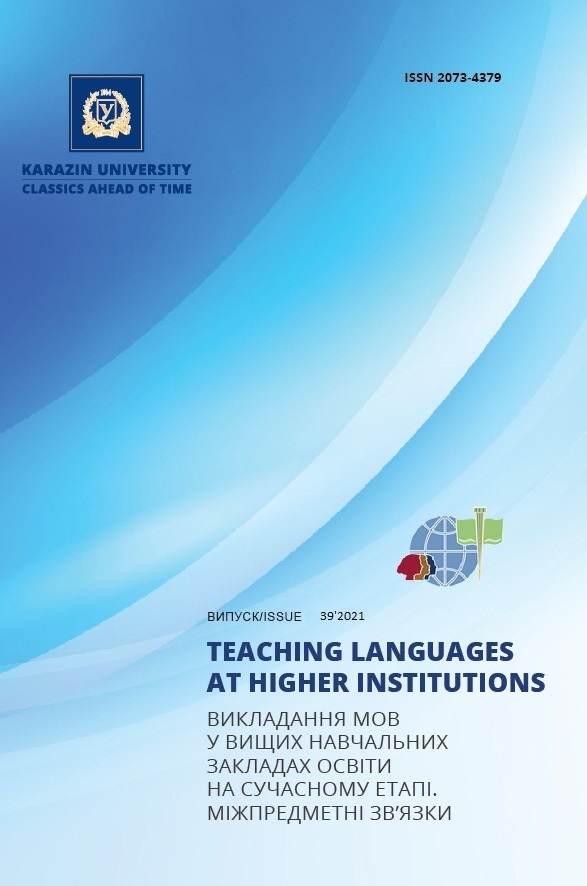Communicative competence of specialists
Abstract
This article is devoted to the formation of business communicative competence of future specialists. Due to the ever-increasing intensity of communication in different areas the study of the phenomenon of business communication is particularly relevant today. The specificity and the complexity of the problems that arise here result from the fact that communication is carried out in incompatible, mostly cultural stereotypes of thinking and behavior, including interaction in professional situations. Communication needs to be effective in any sphere of life. The authors consider communicative competence as professionally necessary, and this proves the urgency of the problem. Communicative competence is seen as the ability to work effectively in a work team, the ability to take into account the individual psychological and national characteristics of a communication partner, use business etiquette, manage conflict and interact fruitfully in cooperation. Business communication involves a constant flow of information. It is the essence of management. The basic functions of management (Planning, Organizing, Staffing, Directing, and Controlling) cannot be fulfilled well without effective communication. Feedback is an integral part of business communication. Business communication is subordinated to the interests of business, the success of which depends on compliance with the rules of legal nature and the rules of interpersonal communication. The authors identified models of business communication. In the practice of business communication, there are models of business communications that are relevant to a particular situation and are implemented depending on the interests of people’s activity. The authors consider the essence and importance of business communications as one of the components of the management process. They analyze and systematize the tasks of business communication, study the types of business communications that have different styles of information transfer, and define the functions of business communications of the enterprise. It is established that it is necessary to have a certain set of ideas, knowledge, information about the principles of business communication to achieve high results of any kind of commercial activity. It has been proven that the ability to successfully conduct business negotiations, competent conclusion of business agreements has become an integral part of the professional culture of managers at all levels. The authors also outline ways to improve internal business communications that will ensure the effective operation of the organization and its positive image.
Downloads
References
Bolshunov, A.Ja., Kiseleva, N.I., Marchenko, G.I., Novikov, A.V., Tjurikov, A.G., Chernyshova, L.I. (2018). Delovye kommunikacii: uchebnik dlja bakalavrov [Business Communication: a textbook for bachelors]. Chernyshova, L.I. (Ed). Moscow: Finansovyj universitet, Departament sociologii [in Russian].
Dawson, R. (2011) Masterstvo obshhenija v ljuboj situacii [Roger Dawson’s Secrets of Power Negotiations]. Kharkiv: Knizhnyj Klub “Klub Semejnogo dosuga” [in Russian]. 3. Krysko, Zh. (2020). Rol komunikacij v systemi upravlinnya organizaciyeyu [The role of communications in the management system of the organization]. Aktualni problemy menedzhmentu ta publichnoho upravlinnia v umovakh innovatsiinoho rozvytku ekonomiky: materialy Mizhnarodnoyi naukovo-praktychnoyi internet-konferentsiyi [Topical issues of management and public management in the situation of innovative development of economy: materials of International scientific and practical online conference]. Ternopil: TNEU, Part 1, pp. 100–103 [in Ukrainian].
Malyk, N.R. (2020). Sutnist dilovyh komunikacij pidpry`yemstva [The essence of business communications of the enterprise]. Aktualni problemy menedzhmentu ta publichnoho upravlinnia v umovakh innovatsiinoho rozvytku ekonomiky: materialy Mizhnarodnoyi naukovo-praktychnoyi internet-konferentsiyi [Topical issues of management and public management in the situation of innovative development of economy: materials of International scientific and practical online conference]. Ternopil: TNEU. Part 2, pp. 301–303 [in Ukrainian]. 5. Orel, V.M. and Kralia, V.H. (2016). Rol komunikatsii v upravlinnia pidpryiemstvom [A role of communications in the management of an enterprise]. Visnyk Kharkivskoho natsionalnoho tekhnichnoho universytetu silskoho hospodarstva imeni Petra Vasylenka [Bulletin of Petro Vasylenko Kharkiv National Technical University of Agriculture]. 174, pp. 60–66. Available at: http://nbuv.gov.ua/UJRN/Vkhdtusg_2016_174_9 [Accessed 2 July 2021] [in Ukrainian].
Popovich M. (2011) Buti ljudinoju [To be human]. Kyiv: Vidavnychij dіm “Kyivo-Mogiljanska akademіja” [in Ukrainian].
Semjonova A.V. and Korsunskaja M.V. (2010) Kontent-analiz SMI: problemy i opyt primenenija [Content analysis of mass media: problems and history of usage]. Moscow: Institut sociologii RAN [in Russian]. 8. Clapper D.L. and McLean, E.R. (1990). Group Decision Support Systems: Towards a Theoretical Framework for Using Information Technology to Support Group Activity. ISDSS Conference Proceedings, pp. 267–282 [in English].

